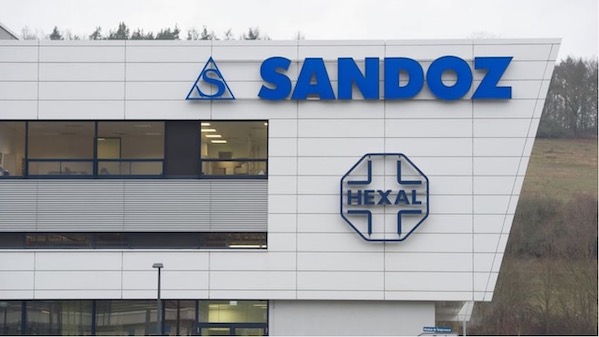Sandoz says its biosimilar matches Eylea in another threat to Regeneron’s blockbuster
August 17, 2023
Source: drugdu
 342
342

With its blockbuster eye drug Eylea, Regeneron is already juggling between a recent FDA rejection and new competition. Meanwhile, biosimilar players are also eying a piece of the pie.
Tuesday, Novartis’ Sandoz said its biosimilar to Eylea showed no clinically meaningful differences with the originator in a phase 3 trial in patients with wet macular degeneration. The two versions were therapeutically equivalent in improving the best vision that patients can achieve.
Sandoz now expects to file the Eylea biosimilar in the U.S. and EU in the coming months.
The Sandoz drug is only the latest copycat to be closing in on Eylea. Viatris was the first to file an Eylea biosimilar in the U.S. in 2021. That asset now belongs to Biocon Biologics through a $3 billion transaction.
In addition, the partnership between Formycon and Coherus BioSciences filed its biosimilar in June, followed on the heels by a separate filing for Celltrion.
Samsung Bioepis recently found that its Biogen-partnered Eylea biosimilar, coded SB15, also demonstrated equivalent efficacy to the reference drug in neovascular age-related macular degeneration.
Still, it’s unclear when these biosimilars may launch in the U.S. A Sandoz spokesperson told Fierce Pharma that the company is targeting a U.S. launch from 2024, “subject to customary launch-related litigation.”
Eylea’s composition of matter patent already expired in June. But the drug’s regulatory exclusivity remains in place until May 2024 thanks to a six-month pediatric exclusivity extension. Besides, Regeneron has certain formulation and methods of use patents stretching into 2032.
Biosimilar developers have been challenging Regeneron’s patents for some time. For example, Samsung Bioepis in April filed an inter partes review petition targeting an Eylea patent.
Biosimilars are flocking to the FDA even as Regeneron deals with new competition and a regulatory setback. The agency in June rejected the company’s closely watched high-dose Eylea because of various problems identified at CDMO Catalent’s manufacturing facility in Indiana.
During Regeneron’s second-quarter report, the company said Catalent would respond to the FDA this month, and that it was targeting an approval by the end of September.
The high-dose Eylea is Regeneron’s counterstrike against Roche’s booming bispecific drug Vabysmo, which pulled in 957 million Swiss francs ($1.1 billion) in sales in the first six months of 2023. Dosing frequency and the ability to dry the retina are key metrics in the market clash between the two meds.
For Novartis, the Eylea biosimilar will soon leave the cradle as part of a planned Sandoz spinoff. Biosimilars are the driving force behind Sandoz’s growth these days. In the second quarter, sales from Sandoz’s biosimilars increased by 13% year over year.
The Eylea copy is one of four key launches that will support Sandoz as a standalone company. These include a recently launched biosimilar referencing AbbVie’s Humira, and two other pipeline projects targeting Biogen’s multiple sclerosis therapy Tysabri and Amgen’s bone med Prolia/Xgeva.
With a growing portfolio, Sandoz is also strengthening its biosimilar capabilities. Last month, the Novartis unit unveiled a $90 million investment to build a new biosimilar R&D center in Slovenia, in addition to a planned biologics manufacturing plant in the country that will cost at least $400 million.
Reference: https://www.reuters.com/business/healthcare-pharmaceuticals/us-fda-declines-approve-regeneron-high-dose-eylea-2023-06-27/
By editorRead more on
- The first subject has been dosed in the Phase I clinical trial of Yuandong Bio’s EP-0210 monoclonal antibody injection. February 10, 2026
- Clinical trial of recombinant herpes zoster ZFA01 adjuvant vaccine (CHO cells) approved February 10, 2026
- Heyu Pharmaceuticals’ FGFR4 inhibitor ipagoglottinib has received Fast Track designation from the FDA for the treatment of advanced HCC patients with FGF19 overexpression who have been treated with ICIs and mTKIs. February 10, 2026
- Sanofi’s “Rilzabrutinib” has been recognized as a Breakthrough Therapy in the United States and an Orphan Drug in Japan, and has applied for marketing approval in China. February 10, 2026
- Domestically developed blockbuster ADC approved for new indication February 10, 2026
your submission has already been received.
OK
Subscribe
Please enter a valid Email address!
Submit
The most relevant industry news & insight will be sent to you every two weeks.



